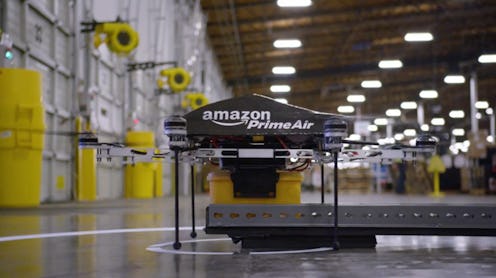News
Amazon's Drone Program Approved By The FAA

If you've ever purchased something online and suffered from that horrible feeling of having to have that product right now, Amazon finally has some good news for you. On Thursday, the Federal Aviation Administration gave its approval to the e-commerce giant to begin testing for its Prime Air delivery service, first introduced in December 2013, which would allow the company to ship goods to customers via drone technology, significantly cutting wait time (down to 30 minutes). Of course, nothing is ever fully granted without a few strings attached, as the FAA's authorization has once again proved through its tightened restrictions on the Amazon drone program itself.
Even with recent loosening of commercial drone laws, the company, which had threatened to take its business overseas if it wasn't granted the approval, must abide by a few key rules that might ultimately morph the face of the program into something much different. According to Amazon's new experimental airworthiness certificate, the company will be required to shift the program's hours of "operation" to daylight hours only — a crucial amendment in the Prime strategy. In a statement on Thursday, the FAA specified that "all flight operations must be conducted at 400 feet or below during daylight hours in visual meteorological conditions", and the aircraft itself "must always remain within visual line-of-sight of the pilot and observer." The administration also restricted pilots to those who have "at least a private pilot’s certificate and current medical certification" — the second part, of course, a somewhat peculiar modification in the eyes of the general public.
The company will also be required to submit monthly statistics, including in-flight hours, technical malfunctions, and a record of all tests performed, reported Mashable on Thursday. The FAA insists that this sort of regulation is not uncommon.
Popular Science lamented in a report on Friday that the new restrictions limit the company from testing anything "meaningful or innovative" at all, while Motherboard Magazine insisted that the regulations prohibited the company from doing much more than dropping off a package to its next door neighbors.
Regardless of the issues that have arisen in the company's new testing platform, the certificate is at least a small step forward into much bigger things, even if it's not quite what they were hoping for. According to TechStory, the drop in pricing and the rise in consumer popularity has boosted the overall drone industry, as interest in the aerial vehicles for private use grows. The question for Amazon now is not if they'll be able to utilize their revolutionary idea, but when.
Writes the company on its website, "Putting Prime Air into service will take some time, but we will deploy when we have the regulatory support needed to realize our vision." At the moment, that regulatory support seems to be flimsy at best — but it's a start.
Images: Amazon Prime Air screenshots (2)